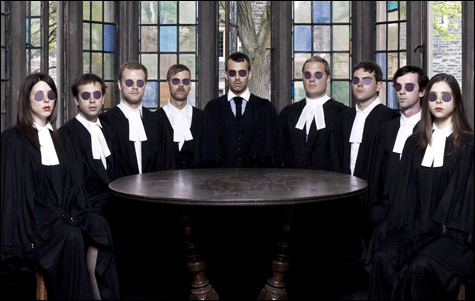
CHURCH-IFIED: If the Hidden Cameras are reduced to the gay man’s R.E.M., then with Origin, they’ve delivered their Automatic for the People — which is to say, they clean up nice. |
One of the worst things you can do as a person-who-writes-about-music is to ask an artist which of his songs is his favorite. For one thing, it makes you sound kind of dull. For another, you’re just gonna put the dude in a bad mood.
“What kind of a person can answer that question?” asks head Hidden Camera Joel Gibb. “It’s like asking a mother who her favorite child is — and I get asked it a lot.”
Just to make this crystal clear: I didn’t ask him what his favorite song was back there. To me, that’d be like asking myself which Hidden Cameras song is my favorite — and that would fall somewhere between aimless endeavor and hopeless impossibility. We were just talking about a lousy interview he’d had earlier in the morning.
“I also always get asked to describe our music, and it’s the most insulting thing to be asked. That’s their job. The person who makes the music doesn’t necessarily want to define their music in one sentence, but that’s always the first question.”
Alas, Gibb’s pain is all too real. Ever since uttering the words “gay church folk music” with the most helpful of intentions . . . well, I don’t need to tell you which word everybody fixated on.
“Now people are kind of looking for something dirty,” Gibb goes on. “I guess that’s my fault, but I’m not that kind of songwriter. I want to write about lots of things.” A snippet like “gay church folk music” is like a Snausage to a music writer on a deadline — pretty much irresistible, and made mostly of sawdust. But even my inclusion of it as a shameful example says something about its encapsulating power with regard to the Cameras.
“People started writing about how graphic and risqué the songs were,” says Gibb, a fleck of frustration in his morning voice, “and then they’d end up misquoting it and making it more perverted, or twisting the meaning to be more sexual than it really is. Like, ‘Golden Streams’ ” — a song off 2003’s The Smell of Our Own — “is not about piss sex. I think it says more about the journalist than it does about me.”
As quick as he is to explain what his songs aren’t about, Gibb is less eager to try to say what they are about. (“I don’t try to write songs; it’s more like they provoke me to be written.”) And though it would be wrong to stamp them all as autobiographical — if only because the way he’s composed and tinkered with them over the course of several years has rendered them more like blurry personal panoramas — it’s fair to say that Gibb himself is their center. Actually, he’s the center of the entire Cameras endeavor: he writes, plays, sings, arranges and produces the music, makes the album art, directs the videos, and conceives the elaborate stage shows. So the music has as much a stake in him as he has in it. “It’s such a strange relationship I have to these records. They’re so much a part of me. It’s hard to have a clear judgment on them.”